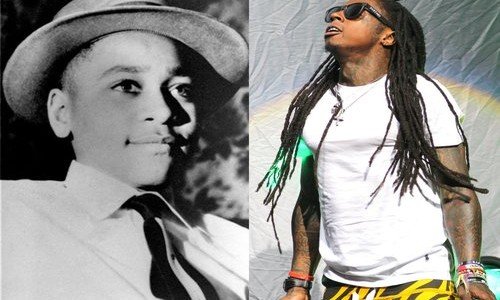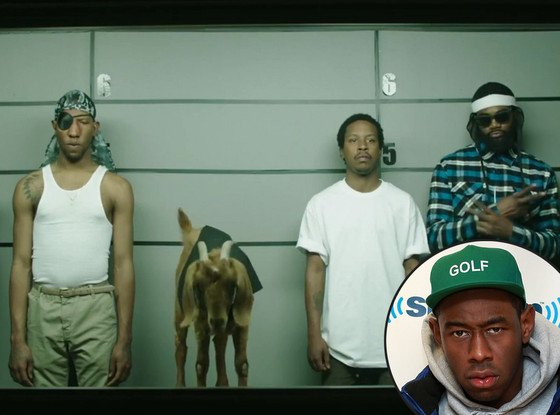PepsiCo has dropped Lil Wayne as Mountain Dew spokesman just days after pulling a racially-insensitive commercial for the soft drink featuring a goat voiced by Tyler, The Creator.
According to TMZ, PepsiCo decided to drop Lil Wayne on Friday after he “unapologetically” compared the beating of civil rights icon Emmett Till to rough sex.
The four-time Grammy winner, who’s fronted Mountain Dew since last year, came under fire in February for his verse in Odd Future’s song Karate Chop.
Lil Wayne rapped: “Pop a lot of pain pills/’bout to put rims on my skateboard wheels/beat that p***y up like Emmett Till.”
The 30-year-old New Orleans rapper, born Dwayne Michael Carter, Jr., deeply angered the Emmett Till’s family who rejected his apology letter for his refusal to write: “I am sorry.”

PepsiCo has dropped Lil Wayne as Mountain Dew spokesmanover Emmett Till offensive lyrics
Airickca Gordon-Taylor was Emmett Till’s cousin and serves as the executive director of the Mamie Till Mobley Memorial Foundation.
She told TMZ on Wednesday: “While it’s commendable that he has vowed to respect the legacy of Emmett Till and his memory to <<not use or reference Emmett Till or the Till family in his music>>, this statement falls short of an apology, as none is mentioned.”
Airickca Gordon-Taylor said the family want Lil Wayne to understand how his comparison of a sex act to the Chicago native’s torture death in Mississippi is hurtful to the black community.
“It was a heinous murder,” Airickca Gordon-Taylor said.
“He was brutally beaten and tortured, and he was shot, wrapped in barbed wire and tossed in the Tallahatchie River.
“The images that we’re fortunate to have [of his open casket], they demonstrate the ugliness of racism.
“So to compare a woman’s anatomy – the gateway of life – to the ugly face of death, it just destroyed me. And then I had to call the elders in my family and explain to them before they heard it from some another source.”
Emmett Till’s death became a symbol of the inequalities faced by the African-American population in society and the legal system.
He was just 14 when he went to Mississippi to visiting family when he was killed for flirting with a white woman in 1955.
Emmett Till was beaten, had his eyes gouged out and was shot in the head before his assailants tied a cotton gin fan to his body with barbed wire and tossed his body into a river.
Two white men, including the woman’s husband, were acquitted of the killing by an all-white jury.
Only months later, protected from being re-tried due to double jeopardy, the killers admitted in a magazine article that they had indeed murdered the teen.
Emmett Till’s body was recovered and returned to Chicago where his mother, Mamie Till, insisted on having an open casket at his funeral.
The pictures of his battered body and the trial were early flashpoints in the civil rights movement.
Bob Dylan even wrote a song about it, The Death of Emmett Till.
PepsiCo has decided to withdraw Mountain Dew goat commercial over criticism that it depicts racial stereotypes and makes light of violence against women.
The online Mountain Dew ad shows a battered white woman on crutches being asked to identify a suspect out of a police line-up of black men and a goat.
One blogger described the 60-second video as “arguably the most racist commercial in history”.
PepsiCo has since apologized for the ad for its Mountain Dew soft drink.

PepsiCo has decided to withdraw Mountain Dew goat racist commercial developed by Tyler the Creator
In the video, the goat threatens to beat the woman up if she identifies him to the police.
The woman eventually screams in horror and runs away.
The dialogue in the clip is a wordplay around “Dew It” – the slogan promoting Mountain Dew.
In a statement on Wednesday, PepsiCo said that it took “full responsibility” for any offence caused by commercial.
It said it had removed the ad from its online channels.
The material was developed by African-American rapper Tyler the Creator.
[youtube JVSrBsZSkSU]
PepsiCo Inc. has launched new drink KickStart that has Mountain Dew flavor but is made with 5% juice and Vitamins B and C, along with an extra jolt of caffeine.
PepsiCo is hoping to boost sales by reaching Mountain Dew fans at a new time of day: morning.
The company said it doesn’t consider KickStart to be an energy drink, noting that it still has far less caffeine than drinks like Monster and Red Bull and none of the mysterious ingredients that have raised concerns among lawmakers and consumer advocates.
But KickStart, which comes in flavors such as “energizing orange citrus” and “energizing fruit punch”, could nevertheless give the company a side-door into the fast-growing energy drink market without getting tangled in any of its controversies.
The drink comes in the same 16-ounce cans as popular energy drinks made by Monster Beverage Corp., which also offers options with juice content. And the TV ad features young men skateboarding, reminiscent of the marketing themes used by energy drink makers.
Simon Lowden, chief marketing officer for PepsiCo’s Americas beverages, says the idea for KickStart came about after the company learned through consumer research that Mountain Dew fans were looking for an alternative to traditional morning drinks such as coffee, tea and juice.
“They didn’t really see anything that fit their needs,” he said.

PepsiCo has launched KickStart that has Mountain Dew flavor but is made with 5 percent juice and Vitamins B and C, along with an extra jolt of caffeine
Simon Lowden said KickStart was developed independently from a Taco Bell breakfast drink introduced last year that combines Mountain Dew and orange juice. PepsiCo says KickStart, which is carbonated, is also not a soda because its 5 percent juice content qualifies it to be considered a “juice drink” under guidelines set by the FDA. A spokeswoman for the FDA said the agency doesn’t have definitions for what qualifies as a soda or an energy drink.
With the growth of energy drinks such as Monster and Red Bull expected to slow, KickStart could also signal the emergence of a new category that plays off the promise of energy and other health benefits, said John Sicher, publisher of the trade journal Beverage Digest.
In a nod to the growing concerns about sugary drinks, for example, KickStart also uses artificial sweeteners to reduce its caloric content to about half that of regular soda; a can has 80 calories.
“It’s a very interesting experiment capturing a number of attributes,” John Sicher said, likening it to Starbucks’ Refreshers drinks, which promise ‘natural energy’ from green coffee extract.
The promise of “energy” has been a big seller in the beverage industry in recent years, with the energy drink market increasing 17% in 2011 even as broader soft drink consumption has continued to decline, according to Beverage Digest.
PepsiCo and the Coca-Cola Co. have largely watched that growth from the sidelines, however, with players such as Monster Beverage and Red Bull dominating the market.
But the surging popularity of energy drinks has also led to sharper scrutiny. This summer, New York’s attorney general launched an investigation into the marketing prices of energy drink makers including Monster and PepsiCo, which also makes Amp. Lawmakers and consumer advocacy groups have also called on the FDA to investigate the safety of the high levels of caffeine in energy drinks for younger people.
Although KickStart may look like an energy drink, it has far less caffeine, at 92 milligrams for a 16-ounce can. A comparable amount of regular Mountain Dew would have 72 milligrams of caffeine while a can of PepsiCo’s Amp energy drink has 142 milligrams, according to the Center for Science in the Public Interest.
By comparison, a 16-ounce cup of Starbucks coffee has 330 milligrams of caffeine.



